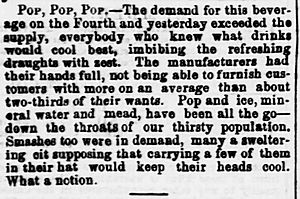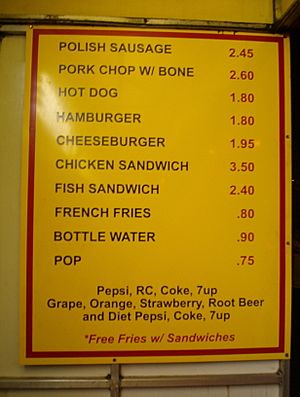Names for soft drinks in the United States facts for kids
The names people use for soft drinks in the United States can be different depending on where they live! The most common words across the country are soda and pop. But in the South, many people just say Coke for any soft drink, even if it's not a Coca-Cola.
Using a certain word for a soft drink can actually show where you're from. People tend to use the words that are popular in their local area. This topic has even been studied by experts, like Bert Vaux, a linguist from Cambridge. He looked into the "pop vs. soda" discussion, along with other words that change from one part of America to another.
Contents
How the Names Started
The word "soda" comes from "sodium," which is a mineral found in natural springs. It was first used in 1802 to talk about bubbly drinks.
The word "pop" was first used in 1812. A poet named Robert Southey wrote in a letter that the drink was "called pop because pop goes the cork when it is drawn." He also joked that "pop you would go off too if you drank too much of it!" Later, in 1863, the two words were put together to make "soda pop."
Here's when some of these terms were first recorded:
| Year | Term |
|---|---|
| 1798 | Soda water |
| 1809 | Ginger pop |
| 1812 | Pop |
| 1863 | Soda pop |
| 1880 | Soft drink |
| 1909 | Coke |
| 1920 | Cola |
Where People Say "Coke"
In the Southern United States, people often use "coke" as a general word for any soft drink. This means they might ask for a "coke" even if they want a Sprite or a Pepsi. This way of speaking is also found in areas near the South, like western Kentucky, Southern Indiana, and New Mexico.
Even though "soda" and "pop" are common in the U.S., a study of Twitter data found that "coke" (or "coca" or "cola") is the most common term in many other countries, including English-speaking ones.
Where People Say "Pop"
The word "pop" is mostly used in the Midwest and much of the West. This includes states like Illinois, Ohio, Minnesota, Michigan, Kansas, Oklahoma, Indiana, Iowa, Colorado, Oregon, Washington, and Alaska.
Where People Say "Soda"
"Soda" is most common in the northeastern states, California, Nevada, and Arizona. You'll also hear it a lot in Hawaii. There are also some areas in the Midwest, like around St. Louis, Missouri and Milwaukee, Wisconsin, where "soda" is popular.
Further down the East Coast, in eastern Virginia, the Carolinas, and coastal Florida, "soda" is also used. However, in these areas, it competes with other words like "coke." People in the coastal Southeast often use different terms for soft drinks.
There's a clear line between "soda" and "pop" users that runs through western Pennsylvania and western New York State. For example, people west of this line (like in Pittsburgh and Buffalo) say "pop." Those to the east (like in Syracuse) say "soda."
Other Names for Soft Drinks
- Tonic: This word has been used in eastern Massachusetts and parts of Maine and New Hampshire for a long time. However, fewer people use it now, and "soda" is becoming more popular.
- Soda pop: Some people, especially in the Mountain West, use "soda pop." In Idaho and Utah, "soda" or "drinks" are common.
- Drink / Cold drink / Carbo: These terms are often heard in southern Virginia and the Carolinas, and they spread as far as Louisiana.
- Soda water: This term is used in more rural parts of the U.S. Sometimes it's even said as one word, "sodiewater," especially in parts of Texas, Oklahoma, and Arkansas.
- Soft drink / Cold drink: These phrases are common in New Orleans and most of east Texas, including the Dallas–Fort Worth Metroplex.
Sometimes, when you go to a restaurant, they might only have drinks from one company, like The Coca-Cola Company or PepsiCo. If you ask for a "coke," the server might ask, "Is Pepsi OK?" This is because some people use "coke" to mean any cola drink. The same thing happens with clear, bubbly, citrus-flavored drinks. People might ask for a 7 Up or Sprite even if they'll be happy with any similar drink. These general uses of brand names don't change whether people in that area usually say "pop" or "soda" for all carbonated drinks.
 | Bayard Rustin |
 | Jeannette Carter |
 | Jeremiah A. Brown |



